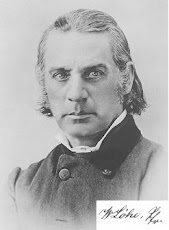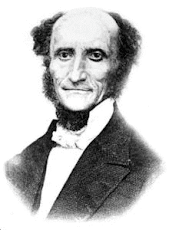Recently there's been in the world of my experience a lot about the Eucharist, Holy Communion, the Sacrament of the Altar, or whatever of its other names you wish. The Roman Church on the one hand is about to issue new translations of its novus ordo missae (The New Order of Mass -- the Vatican II Mass in Latin which replaced the previous Mass in Latin following the Council of Trent) which, given the quality of the translations that have been used for several decades now since Vatican II, might be called the first translations. On the other hand the Moto Proprio of Benedict XVI is about to relax the hoops one must go through to say Mass in the Trent Rite, the only one known to the overwhelming majority of Catholics between the 16th and 20th centuries. Which in turn has brought forth a number of postings on Lutheran sites about our understanding of, yes, the mass, a term from which our Confessions not only do not shrink but describe us as vigourously upholding and defending. And part of that was one of my periodic forays onto the blog of David Schuetz, whom I first encountered on one of my favourite Lutheran blogs -- an Australian convert from Lutheranism to Catholicism, of course that being Catholicism as it is now, which when I was a Catholic I would contend is barely Catholicism at all, which is the message I carried there, not Lutheranism. And of course there's the "worship wars" and all the noise about contemporary worship.
In October 1520 Luther wrote a theological treatise -- in Latin therefore, rather than German -- on the sacramental system of the Catholic Church as distinct from the sacraments of Christ's institution. It is called The Babylonian Captivity of the Church. A good bit of it is given over to the mass. Luther sets out three "captivities": the first is communion in one kind only for the laity, meaning only the host; the second is transubstantiation as not just a way of understanding or explaining the Eucharist using Aristotelian terms but a doctrine; the third is the idea of the mass as a sacrifice.
On this third captivity he writes:
The third captivity of this sacrament is by far the most wicked of all, in consequence of which there is no opinion more generally held of more firmly believed in the church today than this, that the mass is a good work and a sacrifice. And this abuse has brought an endless host of other abuses in its train, so that the faith of this sacrament has become utterly extinct and the holy sacrament has been turned into mere merchandise, a market, and a profit-making business. Hence participations, brotherhoods, intercessions, merits, anniversaries, memorial days and the like wares are bought and sold, traded and bartered, in the church.
-----
Let this stand, therefore, as our first and infallible proposition -- the mass or Sacrament of the Altar is Christ's testament, which he left behind him at his death to be distributed among his believers.
-----
A testament, as everyone knows, is a promise made by one about to die, in which he designates his bequest and appoints his heirs. A testament, therefore, involves first, the death of the testator, and second, the promise of an inheritance and the naming of the heir.
-----
You see, therefore, that what we call the mass is a promise of the forgiveness of sins made to us by God, and such a promise as has been confirmed by the death of the Son of God. For the only difference between a promise and a testament is that the testament involves the death of the one who makes it.
-----
If the mass is a promise, as has been said, then access to it is to be gained, not with any works, or powers, or merits of one's own, but by faith alone.
-----
According to its substance, therefore, the mass is nothing but the aforesaid words of Christ: "Take and eat etc.", as if he were saying: "Behold, O sinful and condemned man, out of the pure and unmerited love with which I love you, and by the will of the Father of mercies, apart from any merit or desire of yours, I promise you in these words the forgiveness of all your sins and life everlasting. And that you may be absolutely certain of this irrevocable promise of mine, I shall give my body and pour out my blood, confirming this promise by my very death, and leaving you my body and blood as a sign and memorial of this same promise. As often as you partake of them, remember me, proclaim and praise my love and bounty toward you, and give thanks."
From this you will see that nothing else is needed for a worthy holding of mass than a faith that relies confidently on this promise, believes Christ to be true in these words of his, and does not doubt that these infinite blessings have been bestowed upon it. Hard on this faith there follows, of itself, a most sweet stirring of the heart, whereby the spirit of man is enlarged and enriched (that is love, given by the Holy Spirit through faith in Christ), so that he is drawn to Christ, that gracious and bounteous testator, and made a thoroughly new and different man. Who would not shed tears of gladness, indeed, almost faint for joy in Christ, if he believed with unshaken faith that this inestimable promise of Christ belonged to him? How could he help loving so great a benefactor, who of his own accord offers, promises, and grants such great riches and this eternal inheritance to one who is unworthy and deserving of something far different?
-----
Actually, during the mass, we should do nothing with greater zeal (indeed, it demands all our zeal) than to set before our eyes, meditate upon, and ponder these words, these promises of Christ -- for they truly constitute the mass itself -- in order to exercise, nourish, increase, and strengthen our faith in them by this daily remembrance. For this is what he commands, when he says: Do this in remembrance of me.
When I read these words, which was during Bible Information Class as some outside reading, I knew I would become a Lutheran. Or more accurately, I knew I was Lutheran, for here was stated cleanly and clearly what everywhere else is either hemmed and hawed or denied, either clouded over with notions of what we or I are doing obscuring the promise given to us and me, or replaced with our or my efforts to offer dynamic worship to produce the very thing for which he gave us the Eucharist.
(Quotations from Three Treatises. Philadelphia: Fortress Press, 1970. Red highlighting mine.)
VDMA
Verbum domini manet in aeternum. The word of the Lord endures forever.
1 Peter 1:24-25, quoting Isaiah 40:6,8. Motto of the Lutheran Reformation.
Fayth onely justifieth before God. Robert Barnes, DD The Supplication, fourth essay. London: Daye, 1572.
Lord if Thou straightly mark our iniquity, who is able to abide Thy judgement? Wherefore I trust in no work that I ever did, but only in the death of Jesus Christ. I do not doubt, but through Him to inherit the kingdom of heaven. Robert Barnes, DD, before he was burnt alive for "heresy", 30 July 1540.
What is Luther? The doctrine is not mine, nor have I been crucified for anyone. Martin Luther, Dr. theol. (1522)
1 Peter 1:24-25, quoting Isaiah 40:6,8. Motto of the Lutheran Reformation.
Fayth onely justifieth before God. Robert Barnes, DD The Supplication, fourth essay. London: Daye, 1572.
Lord if Thou straightly mark our iniquity, who is able to abide Thy judgement? Wherefore I trust in no work that I ever did, but only in the death of Jesus Christ. I do not doubt, but through Him to inherit the kingdom of heaven. Robert Barnes, DD, before he was burnt alive for "heresy", 30 July 1540.
What is Luther? The doctrine is not mine, nor have I been crucified for anyone. Martin Luther, Dr. theol. (1522)
For the basics of our faith right here online, or for offline short daily prayer or devotion or study, scroll down to "A Beggar's Daily Portion" on the sidebar.
23 June 2007
22 June 2007
A Small Milestone
I was recently asked to, and approved by the voters to, serve on my parish's Stewardship Committee. We had our first meeting last night. I joined LCMS and my parish last year, though we had been attending for a year or so before that instead of our WELS parish. So it was really good to be asked to serve and be able to serve in the life of our parish. And really good to go and do it.
There are a few passages in Luther's works which really stand out for me. One of them is in "To the Christian Nobility of the German Nation", where in the context of canonising saints, setting up shrines and having pilgimages, he says:
And let every man stay in his own parish; there he will find more than in all the shrines even if they were all rolled into one. In your own parish you will find baptism, the sacrament, preaching, and your neighbour, and these things are greater than all the saints in heaven, for all of them were made saints by God's word and sacrament.
What a beautiful gift to participate in that!
(The text is from Three Treatises. Philadelphia: Fortress Press, 1970. p. 77. I guess a little income from pilgrimages to a shrine to our first pastor of blessed memory to boost receipts is out of the question, huh.)
There are a few passages in Luther's works which really stand out for me. One of them is in "To the Christian Nobility of the German Nation", where in the context of canonising saints, setting up shrines and having pilgimages, he says:
And let every man stay in his own parish; there he will find more than in all the shrines even if they were all rolled into one. In your own parish you will find baptism, the sacrament, preaching, and your neighbour, and these things are greater than all the saints in heaven, for all of them were made saints by God's word and sacrament.
What a beautiful gift to participate in that!
(The text is from Three Treatises. Philadelphia: Fortress Press, 1970. p. 77. I guess a little income from pilgrimages to a shrine to our first pastor of blessed memory to boost receipts is out of the question, huh.)
Subscribe to:
Posts (Atom)











